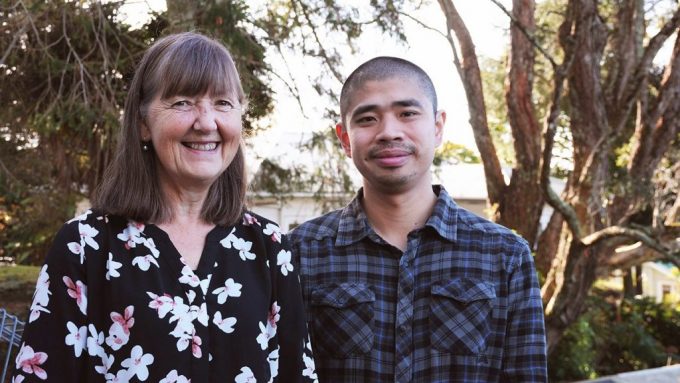
Associate Professor Carol Mutch and PhD student Zhenan Feng: two of the four-person team behind the winning game. Photo credit: University of Auckland
The result of a collaboration between experts in education, computer science and engineering, the game simulates what might happen in an ordinary school classroom during and after an earthquake.
Aimed at Year 7, 8 and 9 students, the five to ten-minute game gives players different pathways and right and wrong options, with the overall goal of helping them stay as safe as possible should the real thing happen.
One of the project partners, engineering PhD student Zhenan Feng, says the visual landscape of the game is based on an actual building in Ormiston Junior College in Flatbush, East Auckland.
“I wanted to design the game realistically, so I took photos and made a model of a particular building at Ormiston, and included the sound of a real earthquake.”
He later trialled the game with 150 students from the school and there was a significant improvement in the students’ knowledge about what to do in an earthquake after playing it.
Some students had thought running outside to escape being crushed was a good idea, for example, whereas it’s best to get under something solid like a desk and stay inside until the shaking stops.
“I was working in Christchurch at the time so I know how important it is to be prepared when these terrible things happen, and the sorts of things that will increase people’s chance of surviving; they need to become a reflex action.”
The original idea for the game came from Dr Vicente Gonzalez, a senior lecturer in the Department of Civil and Environmental Engineering. Dr Gonzalez won a Ministry of Business, Innovation and Employment (MBIE) Natural Hazard Platform (NHP) Grant to develop the concept, alongside Professor Robert Amor in Computer Science.
Zhenan Feng joined the group in 2017, having changed his original PhD topic to focus exclusively on developing the prototype. Associate Professor Carol Mutch from the Faculty of Education and Social Work came on board as Zhenan’s co-supervisor in 2018, adding her extensive expertise in teaching and learning, and also her own experience of having survived the Christchurch earthquakes of 2010 and 2011.
“I was working in Christchurch at the time so I know how important it is to be prepared when these terrible things happen, and the sorts of things that will increase people’s chance of surviving; they need to become a reflex action.”
A part-time resident of Christchurch, Dr Mutch has done a lot of work with children post-quake, including leading a UNESCO project which recorded the earthquake memories of some of the primary school children affected by the disaster.
The next step for the project is to develop a business case for the game’s launch to market, with the team hoping to take out the big $40,000 Velocity prize, open to all category winners in August.
Says Zhenan: “We see this game being globally attractive, with a range of possible emergency situations, users and locations; including offices and outdoor environments.”
The game, called the Editable Immersive Virtual Reality Serious Game, has already cleared the first hurdle, having been chosen as one of the best projects out of hundreds in the 2019 Velocity Challenge.
The team hopes the value and uniqueness of the game will see it made widely available, both nationally and internationally, for everyone’s future benefit.
Velocity is an entrepreneurial programme based at the University of Auckland that supports innovative projects through various stages of development.
Educators and politicians are trying to address the current teaching shortage through different policy settings.…
Melanie Webber was the president of the secondary school union PPTA Te Wehengarua from 2021…
Wait times for paediatric care is having an impact on young people’s education and the…
Home of the brave, land of the free… except when it comes to books for…
Could a gender achievement gap in maths be due to confidence? Sarah Buckley from the…
The much-delayed English draft curriculum is now out for consultation, generating discussion from teachers.
This website uses cookies.